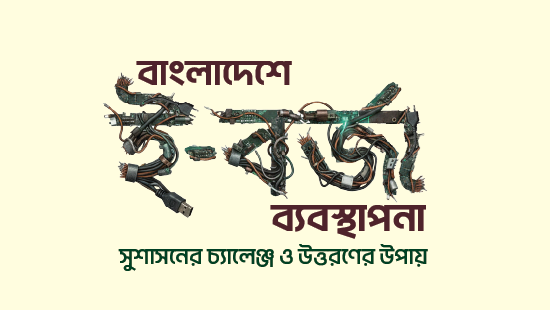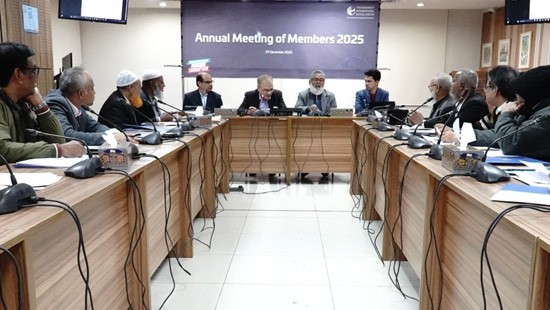Press Release
Dhaka, 30 October 2023: Despite early warnings and comprehensive guidance from the World Health Organization (WHO), there has been a marked deficit of governmental and political priority to dengue prevention and control in Bangladesh. This has resulted in globally highest rate of dengue-related deaths in Bangladesh. Blame for these failures has been unjustly shifted onto the shoulders of citizens. These are the findings of Transparency International Bangladesh (TIB), as revealed during a press conference held to present their study 'Dengue Crisis Prevention and Control: Governance Challenges and the Way Forward'. The study sheds light on the deficiencies in dengue prevention and control and uncovers irregularities and corruption in dengue treatment programmes. To address these issues, TIB has proposed 21 recommendations aimed at promoting good governance in managing dengue outbreaks.
Present at the press conference were TIB's Senior Research Fellow, Md. Julkarnayeen, Research Fellow Razia Sultana, Executive Director Dr. Iftekharuzzaman, Adviser-Executive Management Professor Dr. Sumaiya Khair, and Director of Research and Policy Muhammad Badiuzzaman.
The research highlights the lack of political and administrative attention towards the year-round dengue threat, revealing significant shortcomings in implementing a strategic roadmap that adheres to global standards. Furthermore, it underscores the disregard for the Communicable Diseases (Prevention, Control, and Eradication) Act of 2018, the absence of a unified infection database, capacity limitations, and the exclusion of experts as stakeholders. Additionally, the Health Ministry and Local Government Division failed to coordinate their efforts and operated independently to address the problem.
The research report also reveals that, despite dengue being a year-round concern, all city corporations and municipalities continue to rely primarily on chemical eradication methods like larvicides and adulticides. While some progress has been made in eliminating breeding zones in public spaces, there is a glaring lack of initiatives to eradicate mosquito breeding zones within people's homes. The study further exposes the continued use of the same insecticides for up to 27 years, a practice that leads to pesticide-resistant mosquitoes and makes pest control increasingly challenging. In some areas, pesticides are not subject to testing, and entomologists or public health researchers are excluded from the process. Furthermore, relevant authorities have not proactively disseminated information on dengue through their websites.
The research also points to significant capacity gaps in dengue treatment, particularly among the elderly population, which accounted for the highest number of deaths (19%) and suffered a higher death rate relative to infection rates. The study reveals inadequacies in awareness campaigns and treatment services targeting vulnerable groups like women and the elderly. Simultaneously, financial irregularities and corruption have flourished amid the health crisis. Field workers responsible for insecticides have been observed to use more effective medicines in houses in exchange for payment ranging from 100 to 500 Bangladeshi Taka (TK). Furthermore, the study exposes a trend of single-bid procurements in some cases, where a pesticide supplier received 16 work orders from three city corporations, including seven single-bid procurements. Irregularities and corruption have also extended to dengue treatment facilities, where syndicates artificially created shortages and sold intravenous (IV) saline solutions for 500-600 TK, while they are typically priced at 100 TK. Additionally, dengue testing facilities outside the capital, Dhaka, were found to be inadequate.
Dr. Iftekharuzzaman, the Executive Director of TIB, lamented the lack of a well-defined plan for dengue control despite early warnings, emphasizing that the WHO's guidelines and strategies for controlling dengue were not reflected in Bangladesh's dengue response. He highlighted the failure to replicate successful experiences from other countries and the missed opportunities to leverage Bangladesh’s own lessons from the Covid-19 pandemic. “Unlike the Covid-19 pandemic, experts and stakeholders were not involved in the dengue prevention efforts, and TIB's earlier call to declare dengue a public health emergency was ignored. Authorities appeared nonchalant and, in some cases, evaded their responsibilities, including complacent statements in the parliament about Bangladesh's performance compared to other countries. In summary, the issue of dengue prevention and control failed to receive sufficient political and administrative priority. The problem was exacerbated by a severe lack of coordination,” said Dr. Iftekharuzzaman.
The TIB ED further pointed out that vested interests seized the opportunity, like in every crisis, to engage in corruption and irregularities in procurements related to the dengue response which has been dominated by single bidding. He added, “Syndicates, in collusion with a section of corrupt officials, exploited the situation for personal gain. Local government authorities wrongly blamed citizens for their inability to control aedes mosquitoes, while service recipients were forced to pay exorbitant fees for dengue treatment. Resource allocation and providing of human resources were also marred by discrimination. The lack of accountability resulted in substantial financial losses that opportunistic individuals capitalized on.”
TIB has put forward a comprehensive set of 21 recommendations in their research study, with a strong focus on eradicating Aedes mosquitoes and effectively controlling dengue. Their proposals include the formulation of a "National Integrated Vector Management Plan" aligned with WHO standards, the establishment of a "National Committee on Dengue Prevention" led by the Ministry of Health, and a year-round, integrated mosquito control program employing environmental, biological, chemical, and mechanical methods.
Media Contact:
Sheikh Manjur-E-Alam
Director, Outreach and Communication
Phone: +880241021267-70
Email: manjur@ti-bangladesh.org






